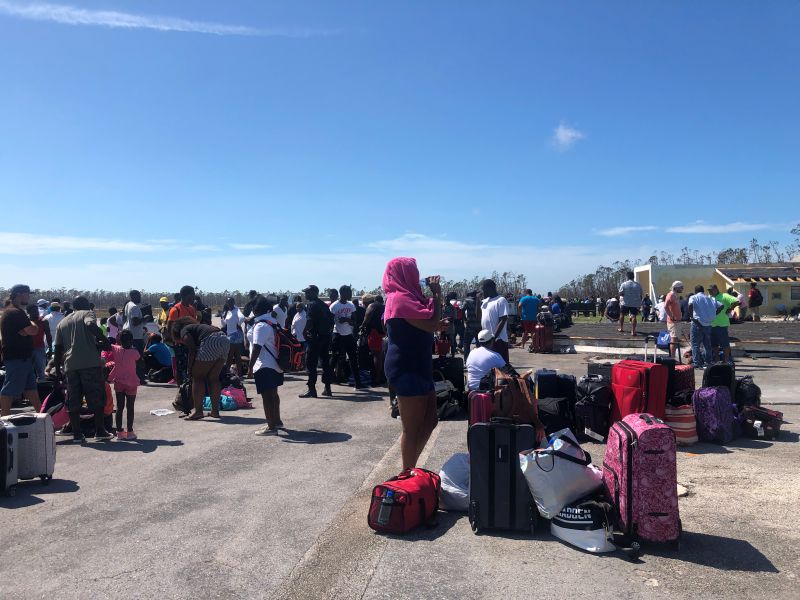As desperation rises, thousands in Bahamas flee Dorian's devastation

Residents and visitors await hopting to catch a flight from the island devastated by Hurricane Dorian at the airport in Treasure Cay, Abaco, Bahamas on September 5, 2019. (REUTERS Photo)
NASSAU, Bahamas, September 8 (Reuters): Thousands of people fled devastation in the Bahamas on Saturday as conditions grew increasingly desperate nearly a week after Hurricane Dorian made landfall, reducing many homes to rubble and knocking out water and power.
Aid groups rushed emergency help to the storm-ravaged islands, and officials warned a death toll of 43 was likely to spike higher as the number of missing among the archipelago nation's 400,000 residents becomes clear.
Even as the aid ships and aircraft headed in, residents abandoned hard-hit Great Abaco Island to seek safety and food in the capital, Nassau, and others headed to Florida for shelter, supplies and perhaps jobs.
Some 90 percent of the homes, buildings and infrastructure in Marsh Harbour of Great Abaco, where Dorian rampaged for almost two full days as one of the strongest Caribbean hurricanes on record, were damaged, the World Food Programme said.
The agency noted that thousands of people were living in a government building, a medical center and an Anglican church that survived the storms, but they had little to no access to water, power and sanitary facilities.
"The needs remain enormous," WFP spokesman Herve Verhoosel said in an email. "Evacuations are slowly taking place by ferry, as hundreds of residents reportedly flee daily."
A cruise ship with more than 1,000 evacuees arrived in south Florida on Saturday. Some had small children or aging relatives who they hoped to find safe lodging for before returning to try to repair or rebuild their island homes.
The risk of outbreaks of diarrhea and waterborne diseases is high as drinking water may be tainted with sewage, according to the Pan American Health Organization.
Travis Newton, a 32-year-old carpenter who survived the storm in Marsh Harbour, said he arrived in Nassau on Saturday morning with his family, trying to find a safe place to live.
He said residents of the town foraged for food and water in the wreckage of damaged stores after the storm passed.
"We had to survive, we had to make it happen, we had to find food, water, where we were aid couldn't get to us, we had to find what we could from the damaged stores," Newton said. "Everybody needs to get out of that place."
The U.S. Coast Guard and Navy were shipping in relief supplies and had already rescued some 290 people from isolated areas on the islands. The U.S. Agency for International Development said it raised its allocation of aid to the Bahamas by $1 million, to $2.8 million in total and had moved enough emergency supplies for 44,000 people to the islands.
Some 70,000 people were in need of food and shelter, the WFP estimated, and private forecasters estimated that some $3 billion in insured property was destroyed or damaged in the Caribbean.
UNUSUAL THIRD LANDFALL
Dorian remained a powerful threat. The storm on Saturday made an unusual third landfall when it slammed into Canada's Atlantic Coast, knocking down trees, cutting power and blowing over a large construction crane in downtown Halifax, the capital of the province of Nova Scotia.
Dorian was reclassified to a very intense post-tropical storm as it lost a defined eye though wind speeds of 150 kilometers per hour (93 miles per hour) were equivalent to a Category 2 hurricane on the Saffir-Simpson scale, the Canadian Hurricane Centre said.
The system was racing north-eastward toward Prince Edward Island and was expected to pass over northern Newfoundland and eastern Labrador late Saturday or early Sunday, the National Hurricane Center said. Local authorities urged anyone who lived close to the seashore to evacuate as a precaution.
Dorian, proving to be a long-lived storm, hit the Bahamas on Sunday and Monday with Category 5 winds, with some gusts topping 200 miles per hour (320 kph).
The hurricane pounded parts of North Carolina's Outer Banks Islands on Friday, and Governor Roy Cooper on Saturday reported the death of a 67-year-old man in Pamlico County on the mainland coast, the state's second fatality in the storm.
LARGE NUMBER OF DEAD FEARED
In the Bahamas, medical chief of staff at Princess Margaret Hospital in Nassau, Dr. Caroline Burnett-Garraway, said two refrigerated, 40-foot trucks would be needed to hold the "staggering" number of bodies that were expected to be found.
"Our relief operation is growing, but we are also facing serious challenges in terms of delivering aid," Red Cross spokeswoman Jennifer Eli said. "Even search-and-rescue choppers haven't been able to reach some people because there's no place to land."
Near an area called The Mudd in Marsh Harbour, a Reuters witness reported most houses leveled, the body of a man lying near a main street and dead dogs floating in water.
Among those who fled Abaco was 19-year-old Isaiah Johnson, who was staying in a hotel in Nassau with his mother and three sisters after the storm's severe winds destroyed their homes.
A wealthy friend had paid for a two-week stay, but after that it was unclear where they would go.
His mother was already searching for work in the United States, Johnson said, reckoning that jobs would be hard to find in Nassau.
"Two weeks might be enough time for me to figure things out," Johnson said on Saturday. "For my mom, I'm not so sure."






